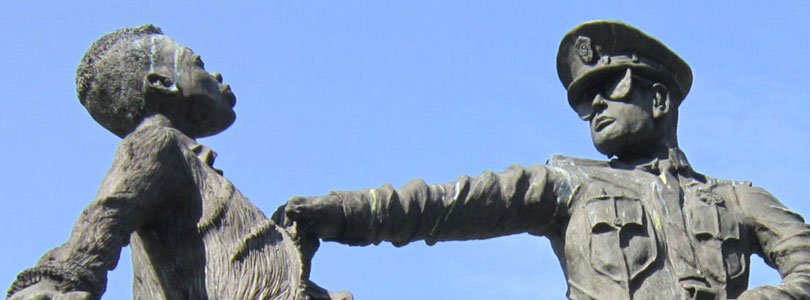Discomfort in the Look
Early on in their conversation on the Uncut podcast, host Matt Allen and guest Don Roach came right up to the edge of a critical point in race relations. At the 9:54 mark, Don, who is black, says:
There are a lot of [white] people who are quiet because they are trying to figure things out, and then there are a lot of people who are quiet because they’re just too afraid to say the wrong thing. And for those people, I would say that you’ve got to come out of that fear and be willing to say the wrong thing. I would almost say, maybe for the first time in our history, white people may feel uncomfortable in their whiteness.
Elaborating on the point, he explains that he means that black people have to be aware of their skin color and what it means to others, because forgetting can have a “negative impact.” Listeners can infer his meaning as being that white people now have to do the same. We have to be more self aware of our skin color.
On one level, the “first time in history” claim is nonsense. Irish people or Italian people or Catholic people or Whatever people have had to be aware of their own differences at times. I still wonder from time to time if I’m not aware enough of the significance of my Jewish last name or of the effect that body differences had on my adolescence.
But on another level, the “in their whiteness” claim is undeniably true, although the reality is arguably an inversion of the underlying claim. We must be aware of whiteness for the first time in history because it has been fabricated to create an Other for people of color (POC). We are “uncomfortable in our whiteness” because we have been forced to be aware of others’ non-whiteness and the ways in which things we say or do might be understood differently from our intentions.
Another black Rhode Islander who has been on Uncut recently is Providence youth activist Kobi Dennis. His Facebook page currently has a video titled, “The Look,” which follows a black man around on his day and shows him receiving uncomfortable looks from whites as they decide where to sit or walk.
I certainly found the awkwardness the video depicts to be familiar, because I’ve felt it from the other end. Race has been made so central to social theory and practice that anybody who entered the adult world in the last 30 years with a certain level of education, at least in some regions, has been forced to be aware of it. So, if I enter a coffee shop and look around, catching the eye of another customer of a different race instantly adds a complicating dimension to my choice of seat. Maybe I need a quiet corner, or shade from the window, or a view of the door, or an angle that won’t distract me with a television, but now that interracial eye contact has been made, my choice of seating might have a negative impact for a fellow human being who misinterprets the reason.
Yeah, I know, woe is me. These are mild discomforts, to be sure. But the point is that it’s the opposite of the direction we should be headed. We shouldn’t be moving toward a society in which everybody is uncomfortable, but rather one in which everbody is comfortable in his or her own skin.
This principle becomes life-and-death important very quickly. Don makes a point about police being “more alert” around blacks, which could be racism in some cases but seems more likely to be a function of exactly this tension and discomfort.
Decades of critical race theory have made race matter in a way that it shouldn’t, and it comes down to the energy and resources our society has spent making us painfully aware of something that, ironically, is not supposed to be a factor at all in the ideal.
Featured image: A civil rights memorial in Birmingham, Alabama, which was featured in a podcast about the false narrative that it created. (In real life, the policeman was trying to prevent the dog from biting the boy, who had inadvertently surprised the canine.)




